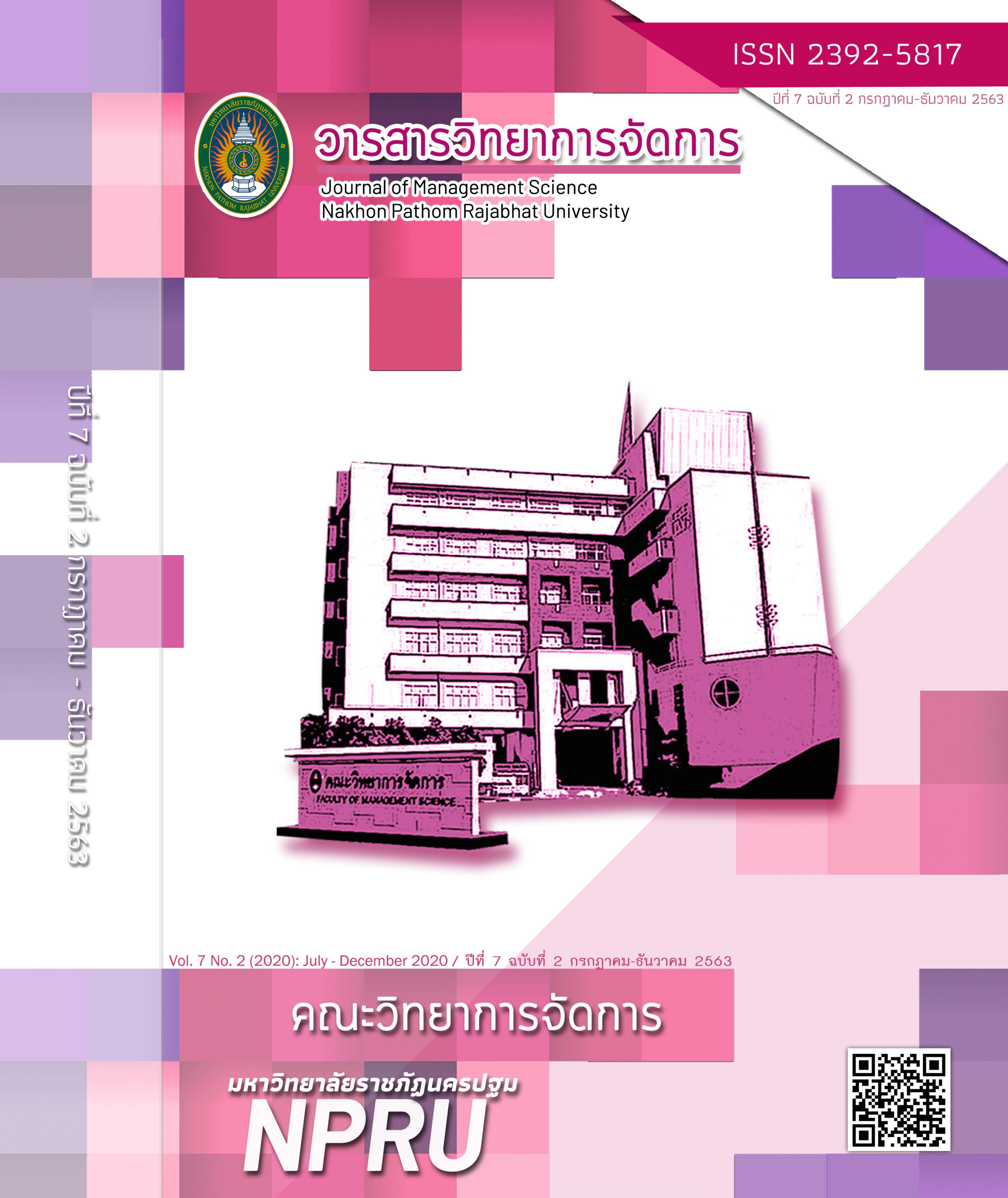Strategy for Developing Potential on Village and Urban Community Fund Management of Village Fund Committee.
Main Article Content
Abstract
The purposes of this research were to: 1) study the current problems of village and urban community fund management of the village fund committees, 2) design the strategy for developing the village fund committees’ potential on village and urban community fund management, 3) try out the strategy for developing the village fund committees’ potential on village and urban community fund management, and 4) evaluate the strategy for developing the village fund committees’ potential on village and urban community fund management.
The research target group, purposively selected, consisted of 8 presidents of village fund networks at the province level, 10 presidents of village fund networks at the district level, 3 presidents of village funds with C (moderate) and D (need improvement) level of management efficiency and potential, and 3 officials from relevant organizations. The 30 village fund committees used in the strategy experiment were purposively selected from 3 funds in Rajaburi Province with C and D level of potential evaluation.
The tools used in the research consisted of an in-depth interview form and a check-list questionnaire for analyzing the current problems of village and urban community fund management of the village fund committees in the target area. The test for assessing knowledge before and after the training on development of the village fund committees’ potential on village and urban community fund management was also applied. The quality of research tools was verified on both validity and reliability. The data were analyzed by computing percentage, mean, and standard deviation. The t-test and content analysis were also used in data analysis.
The research results were as follows:
1. The problems of village and urban community fund management of the
village fund committees were that the operation potential and efficiency of the village and urban community funds was at a low level resulting from the following causes: (1) the committees did not seriously study the manual for management issued by the Office of National Village and Urban Fund, (2) the committees being trained by public organizations and other relevant parties did not have got actual knowledge and lacked transferring skills, (3) the committees lacked learning motivation, and (4) the committees did not take into account the importance of registration and filing systems.
2. The designed strategy for developing the village fund committees’ potential on village and urban community fund management consisted of 5 working system or learning units as follows: 1) a study tour to the successful village funds, 2) provision of knowledge about the village and urban community funds, 3) provision of the academic principle of village and urban community fund management, 4) the process after the study tour and learning the academic principles, 5) measurement and evaluation.
3. The experiment of strategy for developing the village fund committees’ potential on village and urban community fund management revealed that the personnel attending the training according to the strategy system unit had got higher knowledge and understanding after the experiment than those they had got before the experiment with statistical significance at the .05 level and they were satisfied with the strategy and manual for developing the village fund committees’ potential on village and urban community fund management at a high level.
4. For the evaluation and improvement of strategy for developing the village fund committees’ potential on village and urban community fund management, it was found that the committees with low level of performance potential and efficiency (at a moderate: C and need improvement: D level) were improved after attending the training according to the strategy with 5 system units and 14 subsystem units, able to apply knowledge, understanding, and satisfaction in management resulting in having more knowledge and understanding on management and better performance. One of the funds at a moderate level was improved to be a fund at a very good (A) level, and two village funds at a need improvement level (D) were improved to be the ones at a good (B) level. It, therefore, could be concluded that the strategy could actually solve the existing problems without strategy improvement.
Article history: Received 20 November 2019
Revised 19 February 2020
Accepted 21 February 2020
SIMILARITY INDEX = 0.66 %
Article Details
The views and opinions of the article appearing in this journal are those of the author. It is not considered a view and responsibility of the editorial staff.
References
คนึงภรณ์ วงเวียน. (2554). การพัฒนายุทธศาสตร์การท่องเที่ยวเชิงนิเวศอย่างยั่งยืน : กรณีศึกษาเกาะเสม็ด จังหวัดระยอง. วิทยานิพนธ์ปรัชญาดุษฎีบัณฑิต สาขาวิชายุทธศาสตร์การพัฒนามหาวิทยาลัยราชภัฏพระนคร.
จิรายุ หาญตระกูล. (2559). การพัฒนาระบบเตือนภัยทางการเงินเพื่อการบริหารกองทุนหมู่บ้านและชุมชนเมืองอย่างมีประสิทธิผล. ดุษฎีนิพนธ์ สาขาบริหารศาสตร์ มหาวิทยาลัยแม่โจ้.
เจมส์ แมคกราท และบอพ เบทส์,(2560 ). 89 กลยุทธ์ที่องค์กรระดับโลกใช้สร้างองค์กรและบริหารคน.(แปลจาก The Little Book Of Big Management Theories โดย วิชิตา สุนทรพิพิธ). กรุงเทพมหานคร : บริษัท กู๊กเฮด พริ้นติ้ง แอนด์ แพคเกจจิ้ง กรุ๊ป จำกัด.
เฉลียว บุรีภักดี. (2546). หลักการพัฒนาและการสร้างยุทธศาสตร์การพัฒนา. เพชรบุรี : สถาบันราชภัฎเพชรบุรี.
เฉลียว บุรีภักดี. (2550). ทฤษฎีระบบ. เอกสารประกอบการเรียนการสอน. สุรินทร์ : หลักสูตรปรัชญาดุษฎีบัณฑิต สาขายุทธศาสตร์การพัฒนาภูมิภาค มหาวิทยาลัยราชภัฏสุรินทร์.
ณัฐิกานต์ วรสง่าศิลป์ .(2550). การดำเนินงานกองทุนหมู่บ้านและชุมชนเมืองกับความยั่งยืนในอนาคต. เอกสารประกอบงานสัมมนาเชิงปฏิบัติการที่ธนาคารแห่งประเทศไทย. วันที่ 27 เมษายน 2550.
ถาวร กุลโชติ. (2546). ประสิทธิผลการจัดระบบและการบริหารจัดการของคณะกรรมการกองทุนหมู่บ้านและชุมชนเมือง : กรณีศึกษาอำเภอขลุง จังหวัดจันทบุรี. งานวิจัยปัญหาพิเศษ สาขาวิชาการบริหารทั่วไป มหาวิทยาลัยบูรพา.
ไทยรัฐทีวี. (2558). จัดเกรดกองทุนหมู่บ้าน รายการ ชัด ข่าว เน้น. วันที่ 2 กันยายน 2558.
ทองดี มิ่งขวัญ. (2551). ผลของการบริหารจัดการกองทุนหมู่บ้านตำบลกระทุ่มล้ม อำเภอสามพราน จังหวัดนครปฐม. วิทยานิพนธ์ สาขาสังคมศาสตร์เพื่อการพัฒนา มหาวิทยาลัยราชภัฏนครปฐม.
ประเวศน์ มหารัตน์สกุล. (2556). การจัดการและพัฒนาทรัพยากรมนุษย์. กรุงเทพมหานคร : ปัญญาชน.
ยุวดี ไชยเศรษฐ. (2556). การมีส่วนร่วมของประชาชนต่อการดำเนินงานในกองทุนหมู่บ้านสถาบันการจัดการเงินทุน กรณีศึกษา : ชุมชนบ้านท้องคุ้ง หมู่ที่ 4 ตำบลปากจั่น อำเภอนครหลวง จังหวัดพระนครศรีอยุธยา. การค้นคว้าอิสระปริญญารัฐประศาสนศาสตรมหาบัณฑิต สาขาวิชารัฐประศาสนศาสตร์ มหาวิทยาลัยราชภัฏพระนครศรีอยุธยา.
วรวิทย์ เกิดสวัสดิ์. (2552). ยุทธศาสตร์การพัฒนาการท่องเที่ยวเชิงวัฒนธรรมแบบมีส่วนร่วม วัดพระพุทธบาทราชวรมหาวิหาร อำเภอพระพุทธบาท จังหวัดสระบุรี. วิทยานิพนธ์ปรัชญาดุษฎีบัณฑิต สาขาวิชายุทธศาสตร์การพัฒนา มหาวิทยาลัยราชภัฏพระนคร.
ศักดิ์ชัย อัศวินอานันท์.(2560). คู่มือการสร้างมาตรฐานการบริหารจัดการเพื่อการฟื้นฟูและพัฒนาศักยภาพกองทุนหมู่บ้านและชุมชนเมือง. กรุงเทพมหานคร : สำนักงานคุ้มครองสิทธิและช่วยเหลือทางกฎหมายแก่ประชาชน สำนักงานอัยการสูงสุด.
ศิริขวัญ วิเชียรเพลิศ. (2558). กองทุนหมู่บ้านและชุมชนเมืองแห่งชาติ. กรุงเทพมหานคร : สำนักงบประมาณของรัฐสภา สำนักงานเลขาธิการสภาผู้แทนราษฎร.
ศิริมล คัมภีร์พันธุ์. (2556). โปรแกรมการฝึกอบรมเสริมสร้างการทำงานเป็นทีม สำหรับนักศึกษาพยาบาล วิทยาลัยพยาบาลสภากาชาดไทย. วิทยานิพนธ์ศิลปศาสตรมหาบัณฑิต สาขาวิชาการพัฒนาทรัพยากรมนุษย์ มหาวิทยาลัยรามคำแหง.
สำนักงานกองทุนหมู่บ้านและชุมชนเมืองแห่งชาติ (2555). ศักยภาพและประสิทธิภาพการดำเนินงานของ
กองทุนหมู่บ้านและชุมชนเมือง. [ออนไลน์]. ค้นเมื่อ 22 สิงหาคม 2559 จาก http://www.villagefund.or.th/
สำนักงานคุ้มครองสิทธิและช่วยเหลือทางกฎหมายแก่ประชาชน. (2560) : คู่มือกฎหมายและระเบียบที่เกี่ยวข้องกับการดำเนินงานกองทุนหมู่บ้านและชุมชนเมือง. สำนักงานอัยการสูงสุด. กรุงเทพมหานคร : โรงพิมพ์องค์การสงเคราะห์ทหารผ่านศึก ในพระบรมราชูปถัมภ์.
สุชน อินทเสม. (2554). ยุทธศาสตร์การพัฒนาการท่องเที่ยวแบบยั่งยืน จังหวัดประจวบคีรีขันธ์ : กรณีศึกษาตำบลปากน้ำปราณ. วิทยานิพนธ์ปรัชญาดุษฎีบัณฑิต สาขาวิชายุทธศาสตร์ การพัฒนา มหาวิทยาลัยราชภัฏพระนคร.
สุริยกาล ชุมแสง. (2556). การศึกษาเปรียบเทียบขีดความสามารถเชิงแข่งขันห่วงโซ่อุปทาน ระหว่างตลาดนํ้าวัดลำพญาและตลาดบางหลวง ร.ศ.122. วิทยานิพนธ์ปริญญาวิศวกรรมศาสตรมหาบัณฑิต สาขาวิชาการจัดการงานวิศวกรรม บัณฑิตวิทยาลัย มหาวิทยาลัยศิลปากร.
อารีย์ แผ้วสกุลพันธ์. (2553). การจัดการเชิงกลยุทธ์. กรุงเทพมหานคร : ศูนย์ส่งเสริมวิชาการ.
Bandura, A. (1977). Self – efficacy: Toward a unifying theory of behavioral change. Psychological Review. 84 : 191 – 215.


